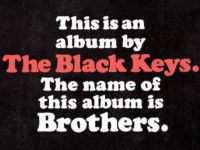To answer the obvious question, yes the Howlin’ Brothers do indeed howl on their major label debut called Howl. They also hoot, holler, bash away at banjos while fiddling as the barn burns down.
At a recent Howlin’ Brothers show, a guy in the audience turned to me beaming and shouted, “I expected bluegrass, but this is a hootenanny!” I couldn’t agree more, and yet, too much focus on the raucous, rowdy good-timey aspects of the Brothers’ act threatens to paint them as the live action version of Disney’s Country Bear Jamboree. Nothing could be further from the truth.
Yes, there is some artifice in the Howlin’ Brothers down-home presentation. Often photographed dressed in overalls, work shirts and straw hats, banjo/fiddle/mandolin player Ian Craft, guitarist/harmonica player Jared Green and bassist Ben Plasse look every bit the Appalachian string band. It should come as no surprise that the band mates are not really brothers, and that none of them hail from the hill country. Yet that doesn’t matter. What counts is that Howl’s modern fusion of traditional music including folk, bluegrass, country blues, funk and rock feels deeply authentic. Just as The Pogues and Solas applied punk firepower to folk and Celtic standards, the Howlin’ Brothers bring modern urgency to the music they love. You know in your gut that this music matters to them.
All three members trade off on vocals, and the fierce intensity of their playing belies their laid-back image. Howl’s authenticity is displayed fresh out of the gate. Lead-off cut and breakout hit “Big Time” is an amiable, heel-kicking dosey-doe, but it also draws on the haunted blues of Charlie Patton and the timeless country yodel of Jimmie Rodgers. Down-home shuffle “Gone” benefits from a shouty chorus that makes an already loosey-goosey tune jump the rails. Craft’s rapid descending fiddle runs on the John Hartford cover “Julia Belle Swain” transform the original’s country swing into a rousing barn-burner.
Aided by a few key outside players, including Warren Haynes of the Allman Brothers and Gov’t Mule, the Howlin Brothers play off each other with telepathic ease, shifting seamlessly to the Dr. John inspired funk of “Delta Queen,” the obsessed and accelerating blues of “My Dog Can’t Bark” and the jazzy Stephane Grappelli-flavored swing of “Tennessee Blues.”
On Howl, the Brothers pull off a howlin’ success, but they also do something far trickier than making a satisfying record. By touching the raw emotions underlying the traditional music they admire, the Howlin’ Brothers execute a call-and response between the hardscrabble past and the anxious present, a field holler echoing across the ages.
- Something Else! Interview: Punk pioneer Jeff Wolfe of the Furys - July 30, 2014
- Something Else! Interview: Steve Latshaw, director of Return of the Killer Shrews - March 4, 2014
- Asobi Seksu – Fluorescence (2011): On Second Thought - November 25, 2013


